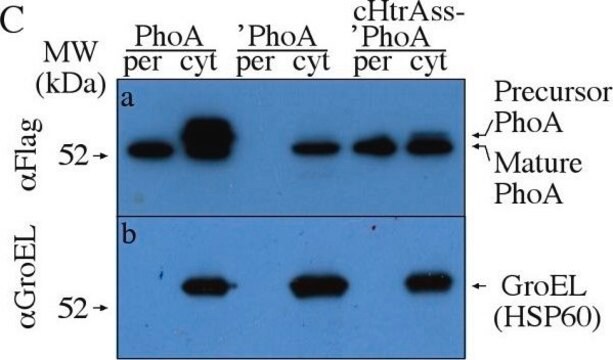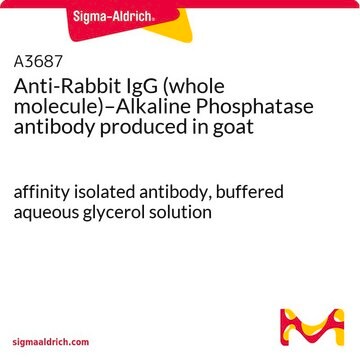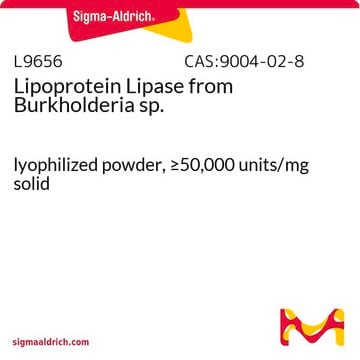A2179
Anti-Mouse IgG (Fab specific)–Alkaline Phosphatase antibody produced in goat
affinity isolated antibody, buffered aqueous solution
Synonyme(s) :
Goat Anti-Mouse IgG (Fab specific)–AP
About This Item
Produits recommandés
Source biologique
goat
Conjugué
alkaline phosphatase conjugate
Forme d'anticorps
affinity isolated antibody
Type de produit anticorps
secondary antibodies
Clone
polyclonal
Forme
buffered aqueous solution
Espèces réactives
mouse
Ne doit pas réagir avec
horse, human, bovine
Technique(s)
direct ELISA: 1:40,000
immunohistochemistry (formalin-fixed, paraffin-embedded sections): 1:25
western blot (chemiluminescent): 1:80,000
Conditions d'expédition
wet ice
Température de stockage
2-8°C
Modification post-traductionnelle de la cible
unmodified
Vous recherchez des produits similaires ? Visite Guide de comparaison des produits
Description générale
Immunogène
Application
- western blotting
- immunoblotting
- enzyme linked immunosorbent assay (ELISA)
- immunohistochemistry
Actions biochimiques/physiologiques
Autres remarques
Forme physique
Notes préparatoires
Clause de non-responsabilité
Vous ne trouvez pas le bon produit ?
Essayez notre Outil de sélection de produits.
Code de la classe de stockage
12 - Non Combustible Liquids
Classe de danger pour l'eau (WGK)
WGK 2
Certificats d'analyse (COA)
Recherchez un Certificats d'analyse (COA) en saisissant le numéro de lot du produit. Les numéros de lot figurent sur l'étiquette du produit après les mots "Lot" ou "Batch".
Déjà en possession de ce produit ?
Retrouvez la documentation relative aux produits que vous avez récemment achetés dans la Bibliothèque de documents.
Notre équipe de scientifiques dispose d'une expérience dans tous les secteurs de la recherche, notamment en sciences de la vie, science des matériaux, synthèse chimique, chromatographie, analyse et dans de nombreux autres domaines..
Contacter notre Service technique




![Tributyl[(methoxymethoxy)methyl]stannane AldrichCPR](/deepweb/assets/sigmaaldrich/product/structures/405/394/e2659ee0-7927-4ef9-b0bc-dc331065f409/640/e2659ee0-7927-4ef9-b0bc-dc331065f409.png)



